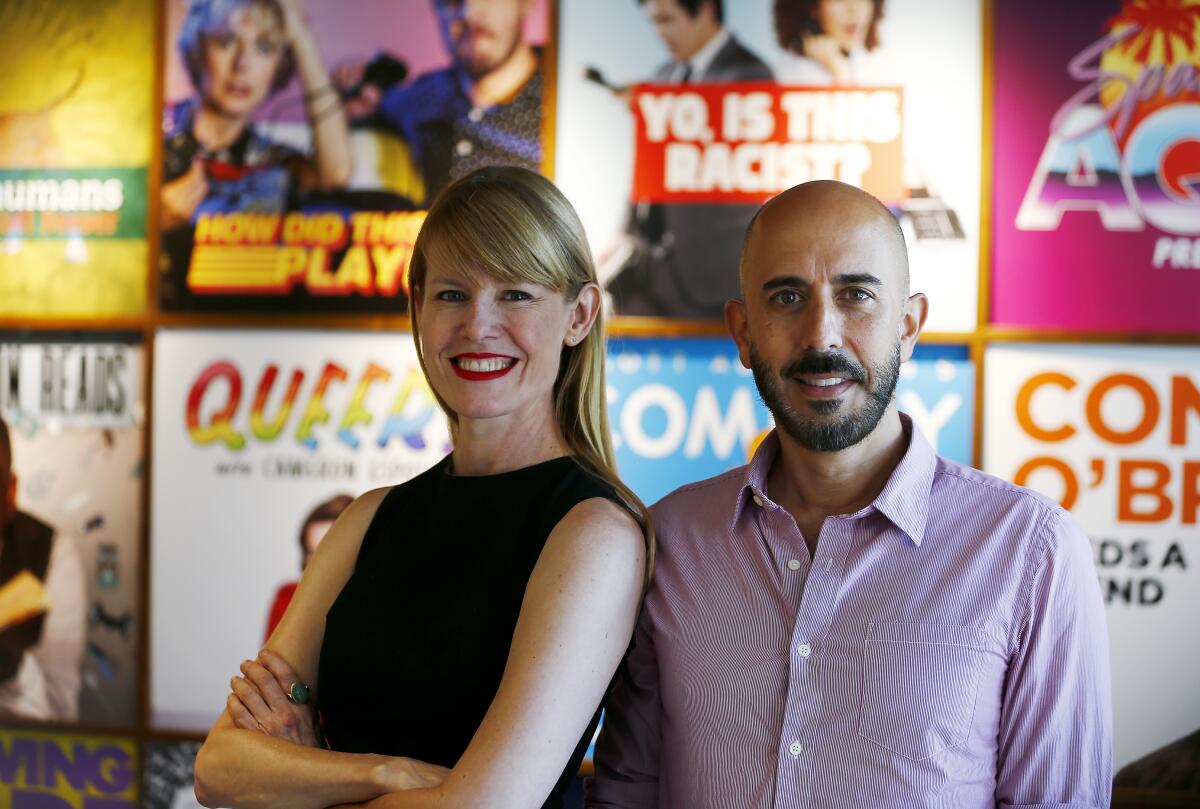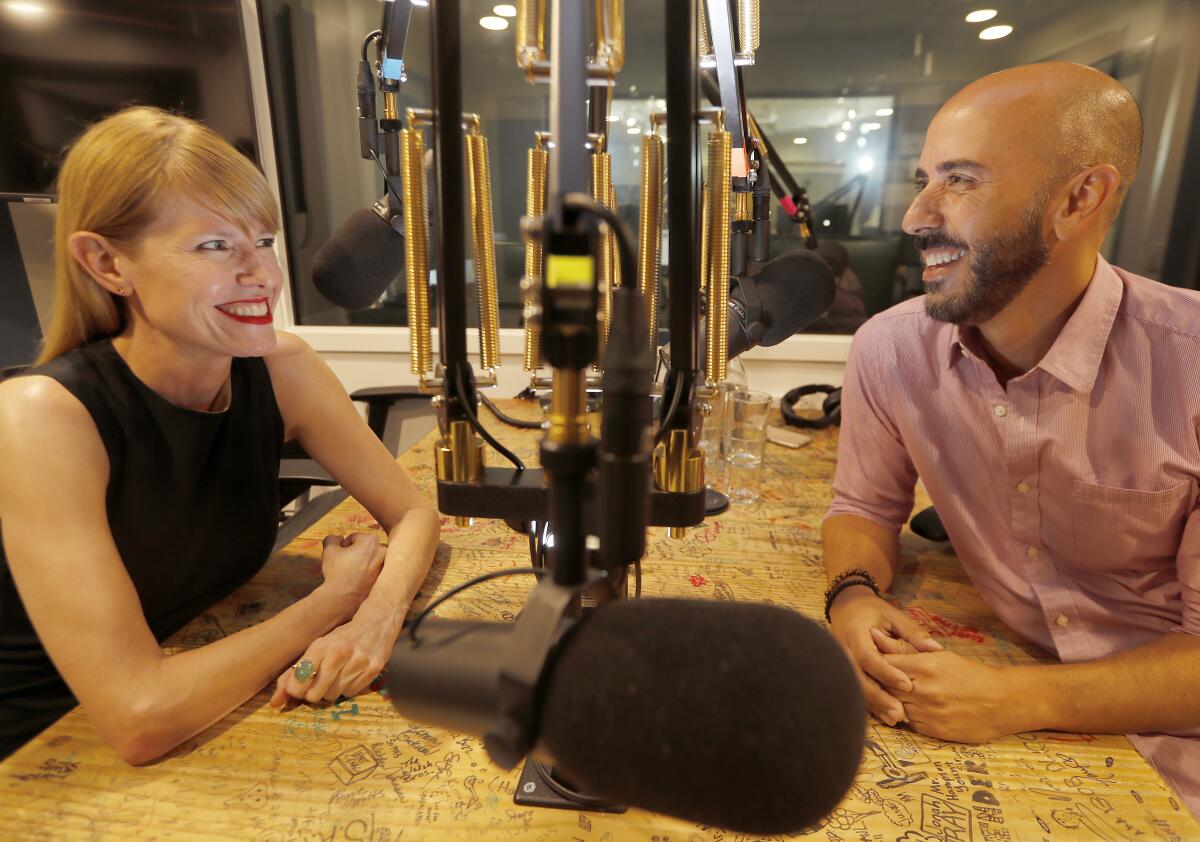Why a mafia wife’s story unearthed in ‘Mob Queens’ podcast is part of queer history too

- Share via
In every long friendship, there’s a tipping point, the moment where passing acquaintance blossoms into something like platonic love. Jessica Bendinger and Michael Seligman’s tipping point arrived in 2004 when Bendinger asked Seligman for advice about fixing up her house.
“In addition to Michael’s other skills, he’s a talented interior designer,” says Bendinger, sitting in a cramped recording booth at the Hollywood offices of the podcast network Stitcher. “He saw my stuff, he saw my problems. He could see I needed help…”
“…And I was like, ‘Oh, girl, I love you,” Seligman says, jumping into the story. “Let’s give you some of that sissy magic.’”
This led to a barter arrangement: “I was like, ‘Listen, I’ll trade you. I’ll give you notes on your screenplay if you help me with my house,’” says Bendinger, who wrote the iconic cheerleader comedy “Bring It On.”
“I like to say that Jessica is my friend-tor because she is [my] bossy big sis,” says Seligman, whose writing credits include “E! True Hollywood Story” and “RuPaul’s Drag Race.” “Whereas I can be very slow and plodding and I need everything planned out, she’s very much like, ‘Just take the leap. Go for it. Do this.’”
These days, the pair’s sentence-finishing interplay is used to full effect in “Mob Queens,” a 12-episode podcast in which they explore the little-known story of Anna Genovese, a mob wife who was a pivotal figure in lower Manhattan’s drag bar scene —and who broke the biggest rule of the Cosa Nostra when she showed up at a public hearing in 1953 and spilled the dirty dealings of her soon-to-be ex-husband, mafia kingpin Vito Genovese.
For the last several weeks, they’ve peeled back the layers on Anna Genovese’s life, taking listeners along on their reporting trips, from the dank catacombs of the New York County Clerk’s office to a cigar bar in Beverly Hills where Bendinger receives hair-raising leads from a made man in his 70s. (When he asks to remain anonymous, she nicknames him “Johnny the Hush” — after which he tells her to drop the “the.”) An unanticipated sub-plot reveals itself when Seligman, who was adopted as an infant, tries to find his birth parents.

It was while researching gay nightlife of the 1950s that Bendiger and Seligman first stumbled onto the story of Anna Genovese. “This name popped up out of the sea of the internet,” Seligman says.
By forging a career running drag bars in Lower Manhattan, Genovese defied the expectation that “mob molls,” as one “Mob Queens” source puts it, “were just there to be housewives, be pretty.” Bendinger and Seligman envisioned the story as a limited TV series but couldn’t get past the pitch stage with Hollywood executives. “They’d just be like, ‘Wow, wow, wow. Your research. Your knowledge. Pass,’” says Seligman.
“Everyone would be like, ‘Unlikable? Female driven? LGBTQ?’” Bendinger continues. “‘Trust me. It can’t be done.’” Never mind that the success of shows like Netflix’s women-behind-bars series “Orange Is the New Black” and FX’s gender nonconforming drama “Pose” would seem to defy that argument.
Last year, a passing acquaintance suggested to Bendinger that she and Seligman attend On Air Fest, a podcasting convention. “Just go,” she told Bendinger. “People in audio are very friendly.” That’s where they met Stitcher senior producer Clare Rawlinson and told her about their obsession with the Anna Genovese story.
To Rawlinson, it was as if they’d just presented her a true crime gift box. Inside were trigger-happy wise guys, a heretofore unexcavated piece of gay history and a lady who took charge of her own destiny while living in a world run by violent, retribution-crazed men. “I couldn’t believe how long they’d been pitching it to producers who were — it seems — blind,” says Rawlinson. “To me, it seemed obvious.” “Mob Queens,” which drops new episodes on Mondays, reached No. 13 on iTune’s top podcasts chart its first week of release.
Less than a minute into the first episode of “Conviction,” the latest release from the Gimlet Media podcast network, the narration takes on a hardboiled tone.
One of the secrets to “Mob Queens’” appeal is that Bendinger and Seligman don’t pretend to be seen-it-all journalists. Rather, the podcast has an engaging “join-us-on-our-journey” quality that feels born of an intimacy between two friends who met 20 years ago at the Coffee Bean & Tea Leaf on L.A.’s Fairfax Avenue and have been chatting ever since. Even so, it took a couple of false starts to get the tone right. When early attempts at having Bendinger and Seligman read from an unchangeable script didn’t get the job done, they tried just gabbing in front of microphones. But this, Bendinger says, yielded “all sizzle and no steak.” Instead Stitcher producers had the pair work from a “soft script” — an outline style often used in reality TV — that stresses the beats of the episode.
“We try to leave lots of moments for spontaneity, keep things as natural as possible,” Rawlinson says. The sound quality of the original interviews in “Mob Queens,” she adds, is intentionally scrappy — sometimes out-of-the-studio conversations are recorded with a Zoom recorder and a shotgun mike, sometimes they go low tech, using the mike function on their iPhone earpod. Bendinger seems to have fallen in love with grabbing sound from unexpected phone calls using the TapeACall app.
As it turns out, the “Mob Queens” cohosts are born gumshoes. Bendinger, who has a wide, toothy smile and a self-deprecating wit, emerges as the one in charge of sweet talking bored civil servants and aging racketeers into pointing her in the right direction. The bearded, brown-eyed Seligman is the internet scourer whose bone fides include being a crack research producer on the E! network’s tabloid-y, celebrity-focused docu-series “Mysteries and Scandals.” This, according to Bendinger, has turned her colleague into a living, breathing Map to the Fallen Stars.
“One of the many beautiful things about being friends with Michael is you’ll be driving around and he’ll say, ‘That’s where Paul Lynde’s boyfriend dropped out the window,’” Bendinger says. “We share that kind of obsession with trivia. Our shared curiosity was of the big, Crazy Glues of our friendship early on.”
No one will confuse “Mob Queens,” which is contracted for two seasons, with any of the more dryly produced history podcasts that present by-the-book examinations of events from the past. But there is an underlying gravity in their intent. If Bendinger sees Anna Genovese as a feminist role model, it might be because after being in Hollywood for almost two decades, she knows what sort of steel it takes to navigate your way through a business where guys make most of the decisions.
Seligman, meanwhile, wants to use “Mob Queens” as a chance to clarify parts of gay history. “Everything starts in 1969 at Stonewall and goes forward from there. The myth is that before then everybody was in the closet, alcoholic, miserable, ashamed,” says Seligman, who five years ago found a cache of letters while cleaning out the storage unit of a recently deceased older friend. “It was like the diary of this group of friends from 1955 to about 1960. The letter writers were all drag queens. And they weren’t ashamed of who they were. They were having a great time. It was wonderful. I want to show other people that whatever you’ve been told about your own history, there’s more to it.”
At one point in Episode 5, Bendinger and Seligman discuss how mobsters and the employees at gay bars in Greenwich Village forged an alliance in a way that reveals how personal this story has become to the two of them.
“Anna just blows us away the more we learn,” says Bendinger. “As complicated as she is, she’s a part of queer history.”
Podcasting
'Audiosphere'
Stories about podcasts and the people making them
More to Read
The biggest entertainment stories
Get our big stories about Hollywood, film, television, music, arts, culture and more right in your inbox as soon as they publish.
You may occasionally receive promotional content from the Los Angeles Times.










